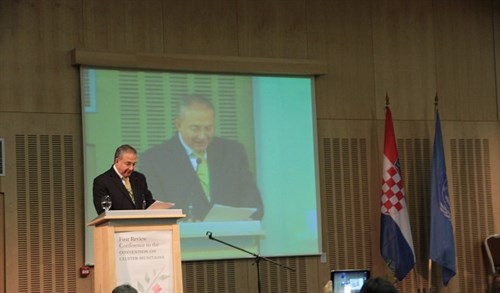08 September 2015
Colombia Joins Global Ban on Cluster Bombs

General (r) Óscar Adolfo Naranjo Trujillo, Minister For Post-Conflict, Human Rights and Security of Colombia, Dubrovnik Review Conference. © CMC, 8 Sept 2015
Today, 8 September 2015, at the First Review Conference of the Convention, in Dubrovnik, Croatia, Colombia announced that it would be depositing its instrument of ratification of the Convention on Cluster Munitions in New York later that day. It would become the 96th State Party to the Convention.
On 3 December of 2008 Colombia signed the Convention on Cluster Munitions. In November 2009, it announced completion of the destruction of its cluster munitions stockpile, well ahead of treaty obligations. It has not reported retaining any cluster munitions. Law 1604 approving ratification of the Convention on Cluster Munitions was enacted in 2012 and underwent a Constitutional Court review ensuring the Convention’s compatibility with the Constitution of Colombia, concluding the process of legislative approval.
Colombia has never produced nor transferred cluster munitions. In the past it has imported munitions from Chile, Israel and the United States. As a former user of cluster munitions, Colombia’s ratification of the convention is significant. It joins the majority of the world (including former users, stockpilers, producers and the most cluster munition affected countries) in rejecting this indiscriminate, outdated and stigmatised weapon.
Colombia’s ratification followed six years of tireless efforts by Colombian campaigners and the CMC to ensure that the process of ratification stayed on track. In April 2015, through a global action, campaigners from around the world sent letters calling on Colombia to ratify. Most recently, on 10 August 2015, director of the Cluster Munition Coalition, Megan Burke and director of the Colombian Campaign to Ban Landmines, Álvaro Jiménez met with Colombian President, Juan Manuel Santos, who announced that Colombia would ratify the Convention on Cluster Munitions by the time of the First Review Conference of the convention.
“Thanks to President Santos and his government for banning these indiscriminate weapons. We urge the government to focus now on surveying areas of Colombian territory where the presence of cluster munitions is suspected, and promoting universalization of the convention, especially in the Latin America countries. Just Argentina, Brazil, Cuba and Venezuela remain to accede to the Convention on Cluster Munitions and make Latin America a cluster munition-free region” said the director of the Colombian Campaign to Ban Landmines, Álvaro Jiménez. “Given the Convention’s strong provisions on victim assistance, ratification also provides a further opportunity to reinforce the implementation of Colombia’s unprecedented Victim’s Laws, which recognizes the right to reparation for all victims of Colombia’s armed conflict, including victims of cluster munitions and landmines,” Jiménez added.
The Convention will enter into force for Colombia on 1 March 2016.


